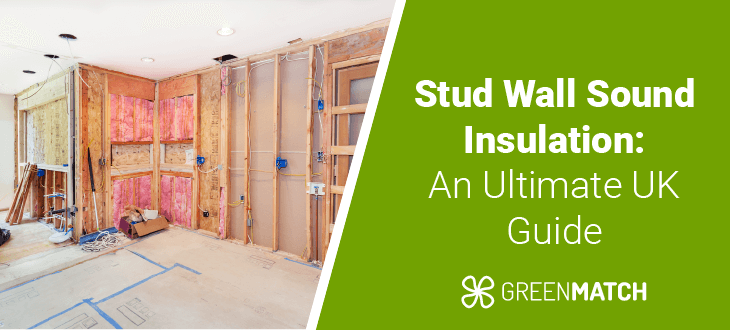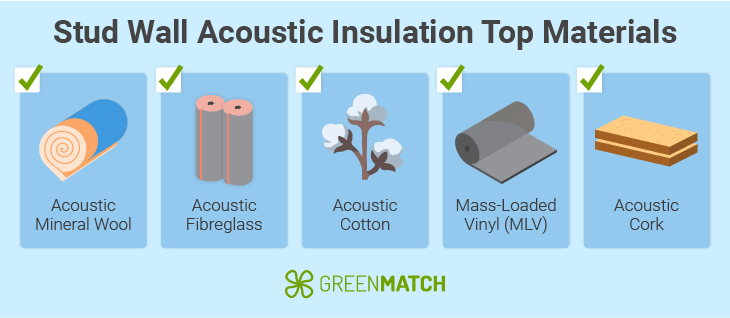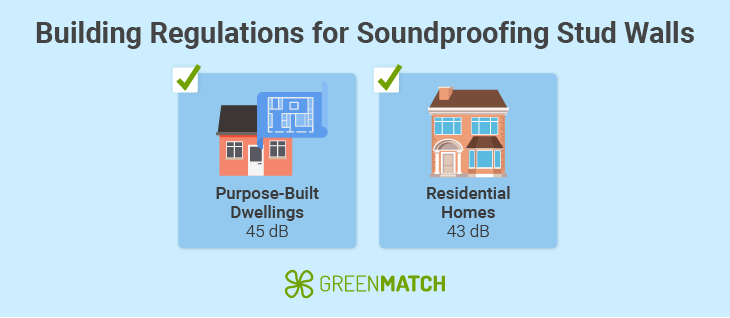Answer these simple questions and we will find you the BEST prices
Which type of solar quotes do you need?
It only takes 30 seconds
100% free with no obligation

Get Free quotes from insulation specialists near you

Save money by comparing quotes and choosing the most competitive offer

The service is 100% free and with no obligation
- GreenMatch
- Insulation
- Wall Insulation
- Stud Wall Insulation
- Soundproof Stud Wall Insulation
Stud Wall Sound Insulation: A Comprehensive Guide


- Stud walls are commonly found in solid wall properties, apartment flats, and inner-partition walls in larger homes.
- Soundproofing your stud walls helps enhance home peace by keeping outside noise out, and home privacy by keeping inside noise in.
- Insulating 25m2 of existing stud wall with acoustic plasterboard costs around £4,200 for a full job.
Stud walls are commonly found in domestic housing throughout the UK, especially in flats and solid wall properties that don’t possess a cavity between the walls. These ingenious faux walls allow for insulation to be placed from within a home, slashing energy bills, reducing carbon emissions, and creating a temperature-regulated and comfortable home.
Got a noisy neighbour? Live in a crowded urban centre? Stud walls are also great for soundproofing insulation, minimising noise pollution and maximising home privacy. This ultimate guide by GreenMatch UK will provide you with all the necessary information for wall insulation for acoustic stud walls, including the process, benefits, materials and costs.
Ready to soundproof your walls? Let GreenMatch UK guide you. Spend just 30 seconds filling out our online form and receive up to 3 free home-tailored quotes directly from our nationwide network of pre-vetted installers. No charges, no obligations. Click below to begin!
- Describe your needs
- Get free quotes
- Choose the best offer
It only takes 30 seconds



Benefits of stud wall sound insulation

Stud wall sound insulation is a home upgrade with a wealth of benefits. From apartment flats in dense urban areas to large homes with many residents, stud wall insulation helps create a perfect living environment.
Here are just some of the key perks you can enjoy with this home upgrade:
- Less noise pollution: Soundproofing your stud walls will help reduce the amount of noise that enters your home from outside. This is especially useful for homes in dense urban areas or flats in crowded buildings. The noise of traffic, commuters, and neighbours can be muffled, creating a more peaceful living environment.
- Enhanced home privacy: In addition to keeping outside noise out, soundproofing helps keep inside noise in. This improves the privacy of your home, keeping your business free from prying ears.
- Increased property value: Homes that are pre-installed insulation measures are often of a higher value in the housing market. You can enjoy higher price brackets if you ever plan to rent or sell your home.
It’s important to remember that acoustic insulation is not thermal insulation, therefore soundproofing does not help retain heat. However, it’s possible to accommodate both types of insulation in the same home. Consult with a professional installer who can sketch out the best course of action tailored to your home.
How to soundproof stud walls
Soundproof insulation for stud walls follows the same procedure as installing thermal insulation. However, since this entire process takes place within the household, it is considered disruptive.
To minimise mess and disturbance to your daily life, it’s recommended that you work with a professional installer who can do a professional job in the shortest amount of time. Soundproofing one room at a time might also help to leave the rest of your home mess-free and habitable.
Here's a general overview of the process of soundproofing your stud walls:
- Assessment: An accredited installer will assess your specific conditions, considering factors like stud wall condition, existing insulation, outstanding repairs and much more.
- Material selection: The right sound insulation material will then be selected following your needs. Common options include acoustic cotton, mineral wool or fibreglass.
- Installation: The installer will clear the area of the wall and remove any obstacles (plasterboard and hinges), install the soundproofing material, and seal any gaps to prevent air leaks.
- Finishing touches: Once the sound insulation is secured in place, removed fixtures, outlets, and switch plates will be reinstalled for a clean finish.
While it’s possible to carry out acoustic stud wall insulation as a DIY project, you must account for the risk of poor workmanship, longer disturbance to your home, and potential repairs that will remain outstanding. For this reason, it's highly recommended to work with a professional installer and save yourself the headache of burdensome repairs down the line.
Here at GreenMatch UK, all it takes is 30 seconds for you to fill out our intake form. In return, receive up to 3 free home-tailored quotes from our network of professionals, free of charges and obligations. Click below to secure your bargain today!
- Describe your needs
- Get free quotes
- Choose the best offer
It only takes 30 seconds



Stud wall acoustic insulation types

Luckily, there’s a whole host of acoustic stud wall insulation materials available on the market, tailored for every budget, home, and purpose. Each material comes with its own unique perks, drawbacks, cost ranges and applications.
Let’s have a look at some of the key options:
- Acoustic mineral wool: A sustainable and affordable blanket made from recycled rock or glass that is similar to thermal mineral wool. These high-density sheets absorb sound waves with great success. For the most effective noise absorption, mineral wool should have a density of over 45 kg/m³ and up to 100 kg/m³.
- Acoustic fibreglass: Similar to mineral wool, fibreglass is made from recycled glass products that are woven into a cotton-like consistency. While slightly less effective than mineral wool in noise absorption, fibreglass is one of the more budget-friendly options on the market today, making it an affordable choice.
- Acoustic cotton: Dense cotton is a tested material that is one of the most effective soundproofing materials. At a density of around 55 kg/m³, acoustic cotton provides a remarkable noise-cancellation and is also entirely eco-friendly and a recyclable insulation material.
- Mass-loaded vinyl (MLV): This leading material is a highly dense sheet that acts as a sound barrier. Due to a high material density, MLV can effectively reflect sound, creating an impenetrable barrier. One con is that vinyl is synthetic, making it a difficult material to recycle and dispose of.
- Acoustic cork: A more natural option to synthetic acoustic plasterboards, high-density cork boards can provide significant noise cancellation. In addition, cork boards are fully recyclable and a sustainable insulation material, making for an environmentally conscious choice.
This is not an exhaustive list and there are plenty more material options on the market. With technological advancements, new options are emerging every day.
What is the best sound insulation for stud walls?
While there is no single best material when it comes to acoustic insulation for stud walls, acoustic mineral wool tends to be one of the most popular options. This is due to its affordability, decent soundproofing performance, and relative sustainability make it a great choice for homes of all kinds.
From a perspective of performance, mass-loaded vinyl (MLV) stands out as the best insulation for soundproofing walls. This is due to the material's incredibly high density, which does not absorb, but reflects sound entirely. This suits rooms that intend to become recording studios or require dead silence.
From a sustainability arc, acoustic cork is one of the best materials. This is because cork is entirely recyclable, biodegradable, and can be produced sustainably with minimal impact on the environment. This makes it a great long-term solution for partition wall sound insulation. It may cost more, but also exhibits a very impressive performance.
Ultimately, the best sound insulation for stud walls will hinge on several factors, such as your overall budget, home type, stud walls, existing insulation and much more.
Stud wall sound insulation building regulations

Part E of the UK Building Regulations documents outline a series of requirements for sound insulation in domestic and commercial properties. Volume one (E1) is dedicated to any structure that is considered a residential dwelling.
- Purpose-built dwellings: The requirement for stud wall soundproofing of airborne sound pollution is 45 dB. In renovations and conversions, the requirement is slightly lower at 43 dB.
- Residential rooms: Soundproofing requirements in rooms with a residential purpose is 43 dB rather than 45 dB.
Ultimately, working with a professional installer is the best way to ensure that the stud wall insulation building regulations are being followed. An accredited contractor can ensure that an approach to your home that helps achieve these soundproofing values is tailored.
Stud wall acoustic insulation cost
Sound insulation for stud walls costs are difficult to predict an average for. This is because many factors play a role in your overall cost, such as your stud wall conditions, area of coverage, existing insulation material, and even your location.
However, we’ve broken down the costs per m2 of some of the most popular acoustic insulation materials on the market today to give you an idea of what you could expect as an investment:
| Insulation material | Cost per m2 |
|---|---|
| Acoustic mineral wool | £13 - £17.5 |
| Acoustic fibreglass | £10 |
| Acoustic cotton | £10 - £14 |
| Mass-loaded vinyl (MLV) | £10 - £20 |
| Acoustic cork | £17 - £22 |
The cheapest way to get acoustic insulation for stud walls may seem like a DIY approach, however, this highly disruptive process requires the dismantling of your walls, addressing outstanding repairs, and much more. Failure to do so properly can turn your home upgrade into a financial nightmare.
That’s why it's recommended to work with professional installers who can tailor the best approach for your home and carry out a job with high-quality workmanship. Finding the perfect installer can be a tough job involving endless hours of research, but GreenMatch UK can take care of that.
Instead of spending all your time on websites and phone calls, just spend 30 seconds filling out our online form, and receive up to 3 free home-tailored quotes from our network of pre-vetted professionals. No costs or obligations apply. Click below to begin!
- Describe your needs
- Get free quotes
- Choose the best offer
It only takes 30 seconds



FAQ
A stud wall is installed with soundproofing insulation the same way you would install thermal insulation. Obstructions of the plasterboard are removed, the acoustic insulation material is added and secured, and then the plasterboard and other fixtures and re-installed for a clean finish.
The best sound insulation for stud walls depends on what you’re looking for. Cost-wise, acoustic mineral wool is one of the most popular options. Performance-wise, mass-loaded vinyl (MLV) stands out as the most effective.
Stud walls should be thermally and acoustically insulated. This is because they are notoriously poor in heat and sound resistance. Insulating your stud walls will improve your home environment drastically.
Part E of the UK Building Regulations document outlines a series of requirements for stud wall sound insulation. Purpose-built dwellings should achieve 45 dB resistance to airborne sound, and residential rooms should achieve 43 dB.

Akif is a copywriter at GreenMatch since 2023. With a keen interest in community sustainability, green solutions and the role of digital media in identifying climate trends, he aims to hone in on his background in International Studies and Digital Media to provide a multidisciplinary approach to written content rooted in credible research and accuracy.
We strive to connect our customers with the right product and supplier. Would you like to be part of GreenMatch?

